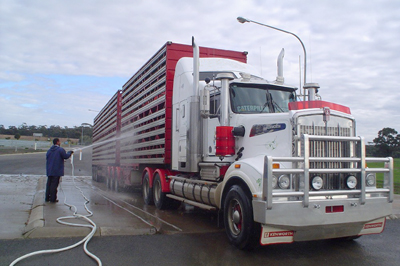
The Coalition has pledged $10 million to upgrading and building wash-out facilities across New South Wales in a bid to reduce effluent spills and improve road safety on livestock transport corridors.
Announced by federal minister for regional development and senator for New South Wales Fiona Nash, State Minister for Roads Duncan Gay, federal member for Page Kevin Hogan and state member for Clarence Chris Gulaptis, the initiative will target key livestock routes.
According to Nash the joint funding commitment demonstrates a focus from the Coalition on delivering improved outcomes for rural and regional industries.
“The meat and livestock industry is vital to our local communities and is a driving force of our national economy – it is essential we foster its ongoing success,” Nash said.
“This new initiative will help [farmers] to go about their daily business in a more efficient and productive manner.”
Gay said effluent spills from trucks had widespread impacts across the state and establishing new wash-out facilities would deliver important flow on benefits to local communities.
“Effluent spills create road safety issues and adverse impacts through potential spread of weed and disease, not to mention negatively impacting local amenity,” Gay said.
“We are committed to filling in the gaps in the livestock truck wash-out network that prevent stock crates from being cleaned out appropriately between loads – this will reduce truck journeys required to find alternate wash out locations and greatly contribute to reducing truck effluent loss.”
Hogan believes local communities in the Page electorate would notice a marked improvement from upgrades to facilities like Grafton Regional Livestock Selling Centre, which processes 1,000 head of cattle a week and is on a key freight route.
“By upgrading Grafton to install another wash-out bay and increasing the bay size to accommodate B-Doubles we cut wash out times by up to half, better meet the truck demand and ensure trucks don’t go back on the road unwashed.”
Key hotspots are being identified, but the program will be open to all eligible regional councils.




